#roger gibson
Text

Harker: The Book of Solomon Part 1 - August 2012, cover by Vince Danks.
#comic books#british comics#hardback#harker#roger gibson#vince danks#the book of solomon#titan books
0 notes
Text
Harker: The Black Hound Part Two arrives in February
Harker: The Black Hound Part Two arrives in February #comics #comicbooks
Since coming to Time Bomb Comics in 2019, dark comedy crime series Harker has quickly become a favorite of the British Indie comic scene. This new comic finishes out the second storyline and will be published in February after a highly successful Kickstarter pre-order campaign.
DCI Harker is enjoying a holiday in Whitby, and the last thing he wants is to be drawn into solving a murder. So when…
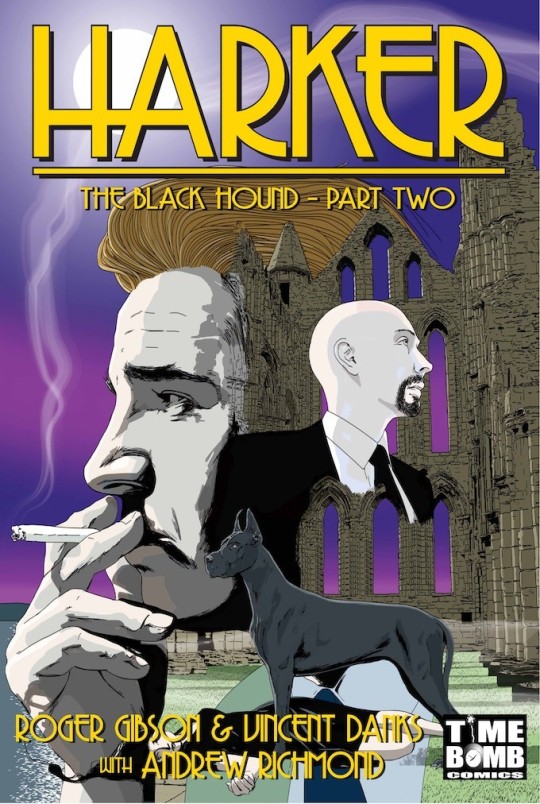
View On WordPress
#andrew richmond#comic books#Comics#harker#harker: the black houd#roger gibson#time bomb comics#vincent danks
0 notes
Text
73 Yards has devastated me and i have some theories
we all agree that 73 Yards was a genre-defying, harrowing episode...and i think there's some really interesting themes and ideas going on here. tw for discussion of trauma, abuse, neglect and abandonment:
i hope we're all on the same page that the Woman seems to represent Ruby's fear of abandonment, brought to life. always present, always out of the corner of her eye, and whose primary mechanic is to drive people to scorn and leave Ruby without explanation. even people who do not know her, or people she's just met, or who are incredibly warm towards her...they speak to the Woman, and they look back as if to confirm their suspicions, and then run away, maddened and horrified.
it is an unbelievable stroke of genius to make the Toymaker's breaking down of the boundaries between science and fantasy bring Ruby's abandonment into being...and for Ruby to weaponise her. but that's it - as soon as Roger ap Gwilliam was taken care of, we expected the Woman to disappear, right? but that could never happen, because Ruby's fear of abandonment will never disappear...no matter how purposeful her life is, or how much she distances herself from others.
the use of the cruel, distant individuals in the Welsh pub to set up Ruby sympathetically is excellent...and then, we see people approach Ruby at all levels of emotional connection, when time and again she is considered untouchable, as if her very being is contagious. and all this time, we have the fairy circle being broken and hope vanishing...with hope being the Doctor. the one man who potentially holds the key to uncovering Ruby's deepest desires - to find out why she was abandoned, and by who.
and at the end of it all...even in death, Ruby doesn't find peace. she is transported into a neverending hell-loop where she is her own abandonment. the two are inseparable, inexplicably the same, because Ruby's very existence as herself is built on the bedrock of abandonment. and i think this resonates heavily with any trauma survivor...the way that our trauma and our very real anxieties brought on by that trauma are inextricable from ourselves.
i think the plot with Roger ap Gwilliam shows off a very real symptom in trauma survivors: we often daydream that our hurt and pain will be useful one day - functional. and not only does Ruby get to do that...she gets to be the quiet, unsung saviour of the whole world, protecting us from a world-ending terror in spite of the abuse and neglect she's faced. she endures menial work and constant fear, while only confiding quietly in one other person...Marti, who i believe is coded as another trauma survivor due to her response to Roger (who she describes as a monster). if Ruby can't receive love and affection from anyone else, at least she can feel satisfied that she served her purpose.
on a practical level, the presence of Mrs Flood and Susan Twist in this episode AGAIN gives me pause. my theory that someone here is another of the Toymaker's Legions, and is the embodiment of Story, has only deepened. the fact that we had a cold open without the title sequence, we met Susan Twist very quickly, we seem to have flipped genres for the show and Ruby was able to embark on a self-destructive wish-fulfilment saviour fantasy in real life...it all indicates to me that the boundaries between reality and fiction are fully collapsing. when Kate says things are trending towards the supernatural lately, i think we've only hit the tip of the iceberg.
on a broader level: my God Russell T Davies, what a brilliant script!!! this is one of my favourite ever episodes of Doctor Who, and is absolutely my highlight for the season. huge kudos to Millie Gibson for giving such a killer performance...i am now terribly endeared to, and protective, of Ruby, and hope against hope she gets the happy ending she so deserves 💖
#i need to lie down. every episode of this fucking season makes my brain require a system restart#doctor who spoilers#doctor who#73 yards#the doctor#fifteenth doctor#15th doctor#ruby sunday#roger ap gwilliam#kate lethbridge-stewart#russell t davies#ncuti gatwa#millie gibson#aneurin barnard#jemma redgrave#mrs flood#susan twist#starleskatalks#long post
403 notes
·
View notes
Text
the Carrionites from the shakespeare code are really a fascinating concept to examine in light of The Post Salt-Line Era (disclaimer: i don’t like the episode as a whole for obvious reasons). powerful witches from the before-times, applying word-magic as a science. words that rhyme or sentences constructed with a specific intent have enough power to stop one of a timelord’s hearts and potentially open a space-time portal. something to keep in mind vis a vis the repeated wordsmithing motif we’ve got going on in s14: spoor “that’s a nice word”; smelted “i’ve never used that before”; ruby was was foundled “what a funny word, foundled”; semperdistans.
if ruby really is a changeling… much as to the carrionites (who were evidently modelled after historical witchcraft folklore), words hold tremendous power to the fae. that’s why there’s all this mythology of faeries “stealing names”: to them, there is no difference between signifier and signified, between a word and the real-life object that word represents, so a name is the person’s actual identity, their personhood itself.
therefore, if ruby really is a faerie child, it makes total sense for her to accidentally be affecting reality through verbal expression in the way she’s been doing throughout the whole series. in space babies, she mentions star trek and suddenly the crew appear in star trek esque uniforms. in the devil’s chord, she mentions strictly come dancing and suddenly they’re dancing opposite two strictly judges. obviously, her word-magic comes to a head in 73 yards: she reads out “i miss you” on the clifftop and the doctor disappears. she reads out “rest in peace, mad jack” and in 20 years gwylliam’s up there on the screen calling himself mad jack (we can presume the original note wasn’t about gwylliam, but an actual villager called jack). ruby speaking messages out loud manifests them into reality. she’s got faerie blood.
#doctor who meta#doctor who speculation#doctor who theory#dw meta#dw#doctor who series 14#ruby sunday#fifteenth doctor#russell t davies#wild blue yonder#the shakespeare code#ncuti gatwa#millie gibson#73 yards#space babies#the devil’s chord#changelings#fae#kate stewart#roger ap gwilliam#esquivalience#👁️#doctor who#the legend of ruby sunday#kitty.txt
237 notes
·
View notes
Text
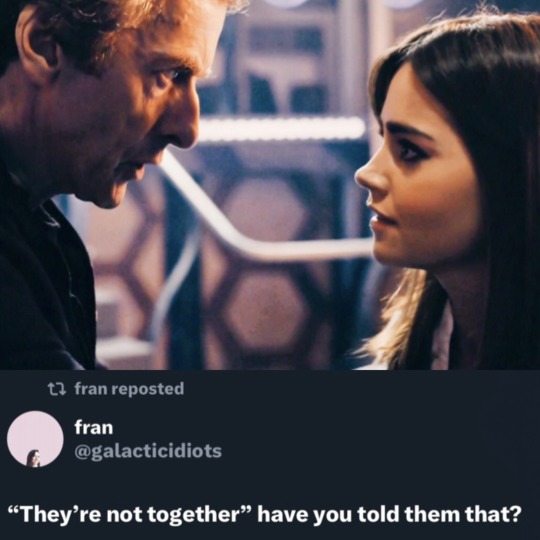
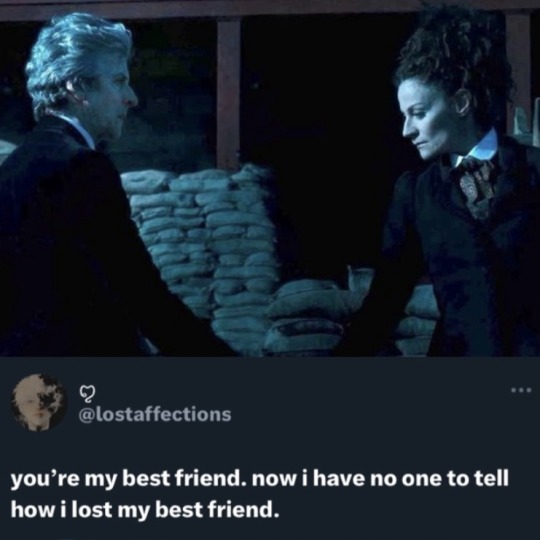

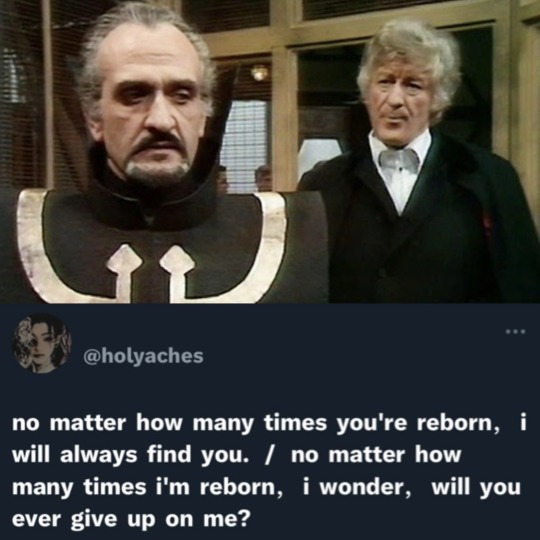

#ridoctorwho#doctor who#Dr who memes#doctor who memes#theta sigma#the doctor#12th Doctor#Peter Capaldi#Clara Oswald#jenna coleman#twelveclara#whouffaldi#koschei#the master#missy!master#missy doctor who#Michelle Gomez#twelve x missy#thoschei#twissy#Ruby Sunday#Millie Gibson#15th doctor#Ncuti gatwa#roger delgado#jon pertwee#third Doctor#threegado#classic who
93 notes
·
View notes
Text
i really want to see a doctor who episode where they meet queen but the members of queen are played by the cast of bohemian rhapsody
#doctor who#queen band#queen#freddie mercury#brian may#john deacon#dr who#roger taylor#smile band#smile#dr. who#15th doctor#ncuti gatwa#ruby sunday#millie gibson#varada sethu#fandom mashup#i would do anything for this#obsession mashup#rami malek#gwilym lee#joe mazzello#joseph mazzello#joseph mazzello III#ben hardy#british things
83 notes
·
View notes
Text
Doctor Who isn't Dead Yet

Last month “Furiosa: A Mad Max Saga,” made headlines for having the lowest box office numbers on Memorial Day weekend. This is in spite of also being number one at the box office, just beating out “The Garfield Movie.” The movie was a certified flop, which is a shame because it’s stupendous (seriously, watch it sometime if you haven’t.) I saw it a week after its release and already it had been relegated to the smallest theatre in the complex with only two screenings on a Friday. This small theatre had maybe eight people in attendance. To look at it, you would have to agree with those who say cinema is dying. It’s ironic then that Sutekh’s gift of death is what appears to have breathed a lot of life into my local cinema over the weekend.
To celebrate the Doctor Who season one finale, the BBC opted to show it in theatres across the UK. The screening began at eleven o’clock with “The Legend of Ruby Sunday,” and followed into midnight with “Empire of Death.” As we arrived, I saw many happy Whovians in cosplay buzzing with excited energy. The lobby was full of people in Tom Baker scarves and blue TARDIS t-shirts chattering away about their fan theories while they loaded up on snacks. The person dressed like the Fourteenth Doctor sitting in front of me was bouncing in their seat so much that I kept getting glimpses of David Tennant hair in my periphery. Needless to say, people were very excited. I don’t know if it was the fact that it was nearly 1 AM, but I did not see that same energy on the way out. So what happened?
It’s no secret that the overall fan reaction to RTD’s finale episode is one of being very underwhelmed. I even used that exact word to my friends on the way out of the theatre. I chose that word carefully. I didn’t want to imply that I hated it, because I didn’t. But after an entire season of build-up, I expected certain conditions to have been met. I’ve mentioned in the past that one of the benefits of this new midnight release schedule is that I often watch the episodes more than once. I find this helpful because the second viewing always allows me the opportunity to view the story divorced from my own expectations. But I have to ask- were my expectations so unfounded to begin with? Where did they come from if not the show itself?
Recently in an interview, Russell T Davies stated that he has been writing Doctor Who in such a way that it would generate a buzz on the internet. If people were talking about it, then maybe people would start watching it. While I am sure this method can increase engagement, it also has its shortcomings. Trickling information is all well in good, but when is it not enough? There is a point where teasing becomes more tedious than tantalising. Just look at Steven Moffat and Trenzalore- a concept that got so dragged out that by the time we finally got there, it was hard to care. Another downside is that it also raises people’s expectations to such a degree that it can be hard to meet said expectations.
Had this episode been written by Steven Moffat, we wouldn’t have picked up right back where we had left off. We’d have probably begun the episode on Agua Santina with the Doctor receiving the spoon from the kind woman. But this is more of a classic Doctor Who-style episode where the cliffhanger continues along. Last week I had guessed that Sutekh was a sort of trinity of Susan Triad, his jackal aspect, and Ruby Sunday. But as we learn in this story, not only is Ruby not related to Sutekh, but Susan Triad is no more Sutekh than Harriet Argbinger. That is not to say that she is any less dangerous in this moment. She holds out her hand to spread the dust of death which quickly begins to envelop London, then the world, and eventually, the universe, or at least the places where the Doctor has visited.

I rather liked the getaway scene with the Doctor and Mel. It was great to see Mel taking control of the situation. The Doctor almost feels like the companion following her away from danger. Her “Come on, cowboy!” line was so good. Once again, I really like what they’re doing with Mel in this season. The fact that she could have been this person in classic Doctor Who really annoys me that she wasn’t. While I grew to appreciate classic Mel in her own right, I’ll take modern-day UNIT Mel over screaming Mel any day. Bonnie Langford is coming here to Glasgow Film and Comic Con in August and I fully expect her line to be longer than when I saw her in 2015. She has been a highlight of this season and I fully did not expect to love her return as much as I have.

As the dust spreads through London, UNIT is still reacting to the presence of Sutekh wrapped around the TARDIS. Last week my friend said to me about Morris’ segway “How much do you want to bet that thing shoots lasers?” And sure enough, it shoots something. The UNIT team unload holy hell on Sutekh and Harriet, but nothing lands. Before getting in a little reference to her father, Kate Lethbridge-Stewart and her team are reduced to dust. Even the Vlinx’s head pops off, so not even robots are safe. Once again, the RTD2 era has borrowed from the Marvel Cinematic Universe. As Sutekh’s dust of death spread across the globe causing people to disintegrate, I leaned over to my wife and said “Mister Stark, I don’t feel so good,” in reference to the Thanos snap. Whatever. Marvel doesn’t own disintegration.
We see Mrs Flood and Cherry get swept up in the dust. Before she dies, Mrs Flood delivers some cryptic words that lead me to think she’s more than just a Time Lord but something far more powerful. However, she’s not so powerful as to avoid Sutekh’s gift. It’s hard to say just what is happening there, so I am not even going to attempt it. The Doctor and Mel find their way through the dust back to UNIT HQ where Ruby is still standing in the time window. Last week I mentioned that the memory of a TARDIS could become the Memory TARDIS from “Tales of the TARDIS,” and boy was I right. I love being right, especially after being wrong all season. I still want someone to be the Rani. At this point, they’re just messing with me.

Before we move along, I do want to call out an aspect of the dust scene that bothers me, and that’s Carla. Last week we saw Ruby tell Carla that she needed to either help or get out of the way. Historically, this would be where someone like Jackie Tyler would find some way to be helpful. I half expected a moment where it feels like all is lost until Carla comes out of nowhere like Ric Flair with a steel chair, saving our heroes from certain doom. It could have even been a self-sacrifice moment where she is still turned to dust. It would have been tragic and fuelled the Doctor and Ruby’s resolve. Instead, we see her in a cab on her way home after having witnessed her daughter's memories invoke the devil. What was even the point of her saying “Well, if your mother's part of it then, Ruby, you can tell her your mother is too,” if they do nothing with it? It felt so out of character for her to up and leave Ruby behind like that, and I feel like that lies solely at Davies’ feet.

It’s funny to me that in the lead-up to “Empire of Death,” people were saying “I hope they explain how Sutekh escaped the time vortex.” Mostly because it hardly matters, but also because they rarely explain how the Master or Davros escape death time and time again. Why is Sutekh any different? What is funny is that Sutekh escapes dying of old age in the time vortex by hitching a ride through the time vortex for thousands of years. Instead of dying, this just makes him stronger. He goes from an Osiran to a full-blown Titan. Sutekh reveals to the Doctor that Susan Triad was an aspect of the Doctor’s granddaughter who he had learned about while integrating himself with the TARDIS. He peppers these aspects of Susan throughout the universe wherever the Doctor lands. However, other than sharing a name, I don’t understand what Susan Triad has to do with Susan Foreman. They’re both brilliant and kind, but is this implying that Susan Triad is what the Doctor’s granddaughter might regenerate into? It’s a bit confusing.
After using Ruby’s memory to fully materialise the Memory TARDIS, the Doctor and his two companions escape Sutekh’s grasp, but even the Doctor senses that maybe Sutekh is keeping them alive. The visual of Sutekh sitting atop the TARDIS in his silent empire of death is an arresting one. I appreciated the sound design allowing the audience to really feel that silence. No music. No people. Nothing. Though on a scientific level, it does strike me as a bit odd that the entire universe is now dead. The Doctor may have had thousands of adventures across time and space, but I have to imagine there are countless planets out there which remained untouched by Sutekh’s dust. But I’m willing to suspend disbelief in this instance.

After tying the Memory TARDIS together with intelligent rope, the Doctor, Ruby, and Mel, drift aimlessly in the Memory TARDIS. It’s uncertain how long they travel this way, but they manage to fit a costume change for the Doctor and an entire episode of “Tales of the TARDIS,” in there. Carrying a television screen still linked with the time window, we learn that the time window is still obeying Ruby’s commands as it had last week. Originally I had suspected this was because she was some sort of aspect of Sutekh, but as we have now learned, it’s simply Sutekh aiding Ruby’s search for her mother. After using the screen to explain to Ruby who and what Sutekh is, the screen also begins to show the Doctor and Ruby a way forward in the form of Roger ap Gwilliam. Meanwhile, Mel is being tracked by Sutekh through the dead cells in her body.

The scene on Agua Santina with the Doctor and the Kind Woman played by Sian Clifford was one of the strongest moments in the episode for me. We had watched the death wave spread across the earth, but this was a way to see how it affected people on an individual basis. Because the death wave happened at multiple points in time, we were able to see how it manifests from multiple angles. Having established the analogous relationship between time and memory, we can see how memory may begin to fade before life. People may still exist, but they won’t remember the name of their birth city because the person who would have named it died before they were able. But even more chilling is how the death wave doesn’t just travel up through bloodlines, but backwards as well. There’s an undeniable cruelty to making a woman have to experience losing her child before experiencing the same fate. It’s evil for evil’s sake and proof that Sutekh isn’t just an arbiter of death, but a demon as well.

The Kind Woman gifts the Doctor a spoon which he promises her he will use to save the universe. Fans of the Twelfth Doctor will have gotten excited by this promise as we’ve seen what the Doctor can do with a spoon. Instead, the Doctor uses it for metal, and possibly not even for metal, but for the memories within the metal. I found this all very weird as they literally showed Mel holding the Thirteenth Doctor’s sonic screwdriver which is not only made of metal, but several spoons. Was there really nothing on the Memory TARDIS with enough memory to jam into that TV screen? It’s a weird series of events punctuated by yet another weird occurrence when the Memory TARDIS gifts the Doctor with a whistle like we’re supposed to know why it’s significant. Nothing in the history of Doctor Who has been controlled by a whistle other than K9. Yet the Doctor puts it around his neck like it makes total sense and isn’t just some non-sequitur moment.
I said last week that I was waiting for “Empire of Death,” before I could fully know how I felt about “The Legend of Ruby Sunday.” Sometimes, a follow-up episode can enrich the experience of a previous story, while other times it can sully it a bit. You can imagine then my surprise when the episode that was sullied wasn’t “The Legend of Ruby Sunday,” but rather “73 Yards,” instead. My takeaway from “73 Yards,” was that the Doctor stepped on the fairy ring, releasing Mad Jack and setting the events of the story into motion. Ruby would then use the semper distans woman to scare away Roger ap Gwilliam and then again to save the Doctor. The Doctor doesn’t stand on the fairy circle, and Mad Jack never escapes. So if Roger ap Gwilliam still exists in the future, what was the point of any of of “73 Yards”? This doesn’t feel “wibbly wobbly, timey wimey,” as much as it feels “wibbly wobbly, shitty witty.” It just feels messy.

The Doctor tells Ruby and Mel that in 2046, DNA cataloguing became compulsory to anyone living in the UK. It feels on brand with Roger ap Gwilliam’s xenophobic platform, so no problems there. Meanwhile, Mel is being used like a spy, but the Doctor has been wary of her since she started appearing exhausted on the Memory TARDIS. The Doctor takes a blood sample from Ruby but just as they get a match on the DNA database, Evil Mel takes the wheel and transports them back to UNIT HQ leaving the Memory TARDIS behind. Finally, Sutekh has the information he needs to learn the name of Ruby’s mother. He will now learn how this unknown person has been able to thwart his gift of death and avoid detection.

What happens next is probably the weakest part of the entire episode. The Doctor and Ruby manage to fool Sutekh into thinking they are about to tell him Ruby’s mother’s identity, but it’s only so Ruby can get close enough to slap some intelligent rope around his collar. Why this feels weak to me is that it means somehow the Doctor and Ruby managed to squirrel away intelligent rope before exiting the Memory TARDIS. This means they would have had to do this without Mel noticing. And while I get that it’s intelligent rope, they basically pull it out of their asses because it’s nowhere to be seen. The fact that intelligent rope is a McGuffin that’s a callback to a pair of gloves many of us will have forgotten since the Christmas episode makes this moment all the weaker. The Doctor then uses his whistle in yet another McGuffin moment that allows him to control the TARDIS and shoot Harriet out the door. With the TARDIS finally back in the Doctor’s control, it’s time to take doggo for walkies!

The Doctor drags Sutekh through the Time Vortex bringing death to death, which causes life. Miraculously, if not luckily, people who we had watched die to the dust are now alive again. Colonel Chidozie is back. The Vlinx’s head is reattached somehow. And Cherry whose final memory of Mrs Flood was of her being cryptic and creepy is so happy to be alive again that she’s hugging the creepy old freak regardless. Cool. Not weird at all. Just people acting like real people. I don’t understand Cherry. She thinks the Doctor is trouble, but Mrs Flood is totally normal. What is it with these last two episodes and getting both Carla and Cherry’s characters so wrong? What gives, Russell?

The Doctor then does the right thing and cuts the intelligent rope, causing Sutekh to burn away in the Time Vortex. I guess this time it’s deadly because he’s not integrated with the TARDIS. That’s my best bet. I’m also willing to bet that the reason it snowed around Ruby and played Christmas music in her presence was due to Sutekh’s influence. He wanted to know the answer so badly that the memory manifested around her any time she got close to it. This is just speculation on my behalf, but it makes enough sense.
Speaking of Ruby’s birth mother (and not her real mother as they kept calling her) UNIT is able to find out who Ruby’s mother is, and she’s just some lady. I know some people were mad about this and I guess I can see why. There was so much emphasis on who her mother was that for it to be nobody special must have been a disappointment. Personally, I thought it was the least interesting mystery of the entire season. I get that she wanted to know who her birth mother was, but I was never emotionally invested in the storyline. The only thing that made it sort of interesting was the idea that there was a reason it was a big deal. You can’t feign surprise when audiences expect something to be big when it’s you who told us to feel that way.

What I find strangest about Ruby’s mother is the way she points at the sign that says Ruby Road. First of all, why the hell was she standing like that? As body language goes, she looks less like she’s naming her child, and more like she’s marking the Doctor for death. Furthermore, why is she dressed like she’s about to hitch a ride on Shai-Hulud? But even weirder is how Ruby even ended up with the name Ruby. Ruby says “I always thought I was called Ruby because the social workers chose it or the paramedics or whatever. But, no, it was her.” But literally the only person who would have seen her pointing was the Doctor, and he left immediately after. So it really was the social workers who chose it or the paramedics or whatever. It feels less like she was pointing to name Ruby, and more like she was pointing to get the internet rumour mill buzzing. It worked, but at what cost?
Ruby finally meets her birth mother in a coffee shop. She’s a nice woman named Louise Miller who looks a lot like Lucie Miller, but I’ve learned my lesson this season with getting my hopes up. While Ruby and Louise embrace for the first time, the Doctor looks on remembering the granddaughter he left behind. Divorced from the hype, I’m fine with Ruby’s mum being nobody special. While I wasn’t a huge fan of Rian Johnson’s “The Last Jedi,” one aspect I really enjoyed was that Rey’s parents were just a couple of nobodies. It reinforced the idea that a Jedi can come from anywhere. Ruby doesn’t have to be anyone special for us to care about her. Unfortunately, so much of her story was tied up in this because ultimately, it did hurt her character development. I’d like to think that this is all part of the growing pains in finding a new equilibrium of fan excitement and good storytelling.

The Doctor knows he and Ruby must part ways. She has a whole new chapter of her life to explore and he would only get in the way. I mentioned after “Rogue” that Ruby was reminding the Doctor to embrace his human side, and here it is all over again. She has reminded him of the importance of family. He lets Ruby go because he can see that her need for a place to belong is greater than his need to have a travelling companion. Even if Ruby can’t see it right away, the Doctor is right. Their time together has come to an end. While Ruby has left the TARDIS, you do get the impression that we’ll see her again. There have been rumours that Millie Gibson has filmed some of season two, so don’t be surprised if we do see more of Ruby Sunday.
On a second viewing, I liked this episode a lot more than the first time. Like I said, divorced from my own expectations, I could see the episode for what it is. But the audience’s underwhelmed reaction is partly the fault of Davies’ machinations to get the internet talking about Doctor Who. He spends an entire season talking about the Doctor’s granddaughter Susan, but the only time we see Carole Ann Ford is in a flashback of her face with zero dialogue. We’re led to believe Mrs Flood is going to be something, but every time we feel like she is about to reveal some more information, she gives us more of the same tired bullshit she’s been doing since the first time we saw her. It begins to feel like television done in the same model as live service games. Keep subscribing. Stick around for additional content. Things trickle out over a gruelling pace. They gave us answers, but it feels like they could have given us more. Who was the Boss the Meep referred to? Is it the same Boss as the one giving Rogue so much paperwork? Will Susan actually appear at some point? Who is Mrs Flood and why is she always dressing like the Doctor’s companions? Instead, we learned who Ruby’s birth mother was, which, as I said, was the least interesting mystery of them all.

I do hope that these are just Davies and Co. finding their footing. The previous first season with Christopher Eccleston had a lot of experimentation as well. I somewhat wish that they had waited to see fan reactions before filming so much of season two. It might have done them some good to see people’s reactions to some of their big changes. I’m as rainy day a fan as rainy day fans get and even I felt they missed the mark on occasion. I think in trying to court a younger audience they lost a little of the essence of what made the show so appealing in the first place. Good writing and unique situations are the bedrock of Doctor Who. It doesn’t need to be Star Wars or Marvel. The fact that Doctor Who isn’t those things is why I love it so much. I can’t be alone in that.
The Christmas special is next. Followed by season two. After that, who knows? While Doctor Who has been number five in streaming drama, it hasn’t quite done the numbers Disney and Davies were hoping for. The show haemorrhaged viewers during the Chibnall era and even more when culture war pissants cried foul over trans actors and Davros redesigns. But it’s also just a symptom of the times we live in. Television is changing. People prefer short-form videos in portrait mode. The glut of streaming services is pushing away consumers while AI threatens to replace writers and artists alike. I’m reminded of Alan Moore when he said “I believe that our culture is turning to steam.” It’s important now more than ever that we continue consuming art made by real people. Regardless of whether you felt underwhelmed with the finale, keep watching Doctor Who. Show it to your friends. Host watch parties. Go see it when they play it in the theatres. Rewatch it when you’re feeling blue. Keep making fan art. Keep writing fanfic. Keep voicing your reactions, good and bad. Get over petty fandom squabbles. Because there may come a day soon when there is no new Doctor Who to get upset over.
#Doctor Who#Fifteenth Doctor#Ncuti Gatwa#Ruby Sunday#Millie Gibson#Carla Sunday#Cherry Sunday#Sutekh#Mel Bush#Bonnie Langford#Kate Lethbridge Stewart#Rose Noble#Gemma Redgrave#Morris Gibbons#Yasmin Finney#Lenny Rush#Sian Clifford#UNIT#Roger ap Gwilliam#Season 1#TARDIS#timeagainreviews#Empire of Death
52 notes
·
View notes
Text









Lethal Weapon my beloved 💕
#these movies are so underrated I love their dynamic#80s#mel gibson#lethal weapon#danny glover#Roger murtaugh#Martin Riggs
21 notes
·
View notes
Text










MAD MAX
Australia
1979
Directed by George Miller
13 notes
·
View notes
Text

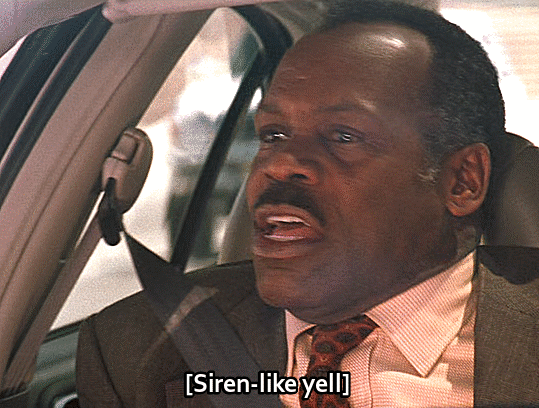
Lethal Weapon 4 (1998) directed by Richard Donner
#Lethal Weapon 4#Mel Gibson#Danny Glover#Martin Riggs#Roger Murtaugh#lethalweaponedit#lethalweapon4edit#lw4edit#GIF#my gifs#movieedit#filmeedit#lethal weapon 4 rewatch#Hide and Queue
48 notes
·
View notes
Text
mulder and diana literally have the most intense divorced energy anyone could ever have...they have the chemistry of two people who've been married for decades and maybe don't wanna be married anymore, maybe aren't married anymore, but once you're married you're grandfathered in. you're always married. haven't touched each other in years, go most days not even considering the other, but owe each other something, and aren't sure of what it is. diana lies and lies and lies to his face, and then dies to save him. she feels entitled to him, she knows what's best for him, what's his is theirs. always. she was there when he got it. she helped him build it. (she tells him herself: "don't forget that"). so much of what she does appears as she's trying to establish a claim over him, but she doesn't have to try. she just is. she's irreproachable. you don't talk about the wife. (and you don't talk to her, as scully and diana arguing is met only with mulder's impatient, "scully...scully...scully.")
any time she comes up in conversation, his friends are uncomfortable. i love the way byers goes "well....yeah?" when scully asks if he knows diana. he says it like he's surprised that scully didn't know about her. when scully won't stop pressing mulder about diana in one son, all three of the boys tense up. the camera keeps going to their reactions. (you don't talk about the wife. they were there. "i always wondered why they split up.")
scully says "special agent diana fowley" as though maybe if she had one more title to throw in, she would disappear. diana says "fox" like she has something to prove. mulder says "diana" like it communicates everything he doesn't say. and in a way, it does. the first time scully heard him call agent fowley "diana," she knew.
#just because it isn't warm doesn't mean dd and mimi rogers didnt have chemistry#they have the chemistry of two people who played a married couple in a movie that ends with religiously motivated murder/suicide#they have cold ancient unsettling chemistry#watch any scene between the two of them and tell me it doesn't feel exactly like your parents silently moving through the house. saying#what they aren't saying#txf.txt#diana#the direction and camera placement in 'one son' frames scully as SO small#especially in that argument scene#they filmed it from mulder's eyeline/perspective#whereas typically scully's side would've been shot at her level (over his shoulder) or they would've put her on the box#but it's set up to where she is so small in front of him. and she FEELS small. and she is small. she's disadvantaged.#and it isn't fair. because where the fuck was diana? does having started it count more than following through? does having been there first#when gibson said that scully doesn't worry about what ANYONE thinks. 'except for her.'#what diana thinks matters. she's this looming figure with so much influence. and she IS irreproachable.#he won't let a word be said about her. she won't let anyone else have final say over him.#and more than anything else that's why i think they were married. more than the wedding ring in flashback episodes. more than the tension#they have this territoriality that feels very specific to divorce
28 notes
·
View notes
Text
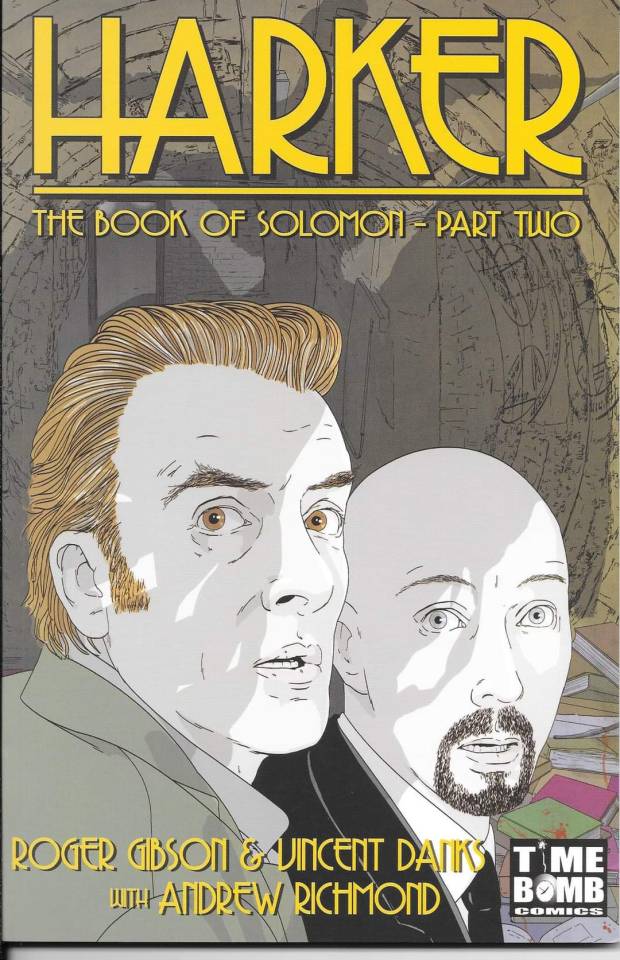
A superb graphic novel from the folk at Time Bomb Comics here in the UK:
Harker - The Book of Solomon Part II by Roger Gibson, Vince Danks & Andrew Richmond.
Like the majority of Indie publishers here in the UK at the moment, this was financed through a Kickstarter campaign.
Part 1 originally came out way back in 2012 from Titan Comics in hardback (and Time Bomb recently published a new edition in softback) so this concluding chapter has been a long time coming!
#comic books#british comics#harker#book of solomon#kickstarter#roger gibson#vince danks#andrew richmond#time bomb comics
0 notes
Text
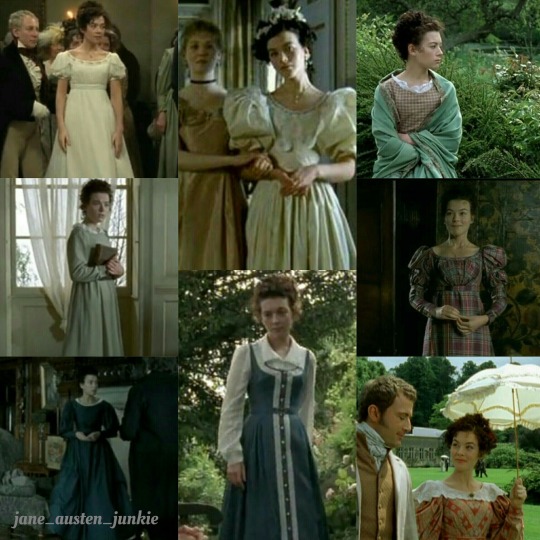
Justine Waddell as Molly Gibson in Elizabeth Gaskell's Wives and Daughters
25 notes
·
View notes
Text
what exactly was supposed to be going on between Marti and Gwilliam? why was she still working for Albion if she despised it, if not to sabotage it from within like Ruby was planning to? would i be right in catching a subtextual implication of blackmail & s3xual extortion/abuse from Gwilliam to force her to remain by his side or is that a reach
#73 yards#doctor who spoilers#doctor who meta#roger ap gwilliam#aneurin barnard#ruby sunday#dw#doctor who#millie gibson#russell t davies#kitty.txt
75 notes
·
View notes
Text
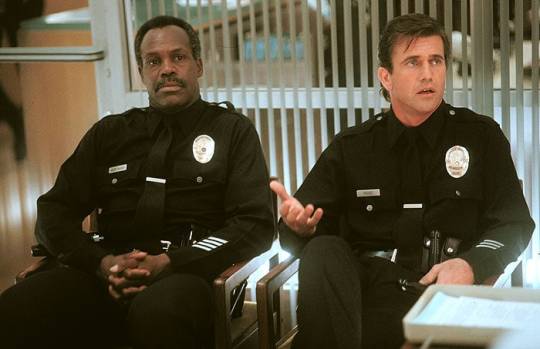
21 notes
·
View notes
Text
A Foot in Two Worlds: 73 Yards

My third-grade lunch buddy was a girl named Kendra. We used to love chatting about movies and television. My favourite topic was Batman. Hers was Full House. However, one morning, instead of gushing over Stephanie Tanner, she told me about a movie she and her brother had watched over the weekend. The movie was 1989’s “Clownhouse,” and she was a bit traumatised by it. And because of her vivid description, so was I. Honestly, I don’t remember anything past her saying “It’s about these kids who see clowns watching them through their windows,” because I never stopped thinking about that sentence, for years. While I’ve still never actually seen Clownhouse, nor do I experience coulrophobia, the idea of being watched from a distance still creeps me out. I still close the blinds at night.
Initially, I wanted to compare “73 Yards,” to something like “It Follows,” or even “The Immortal Snail.” Both scenarios entail being tracked by a slow but relentless pursuer who kills you if it ever catches up to you. But “73 Yards,” isn’t so much a story about being pursued. It’s about feeling watched. It’s about feeling judged. It’s about feeling abandoned. It preys on our fear of being the subject of gossip. That people could spread lies about us that scare away our loved ones. The fear that maybe they’re right. Maybe we don’t deserve love. It’s about the ambiguity that sits within our hearts. The liminal threshold between us at our best and us at our worst. But it’s not just about the wicked and the divine, but also body and spirit. A foot in both worlds.
Doctor Who currently has a foot in both worlds. The Doctor steps on a science fictiony land mine one week, and the next week he’s stepping on fairy circles. A recurring theme in this new season is “look before you leap.” Or ‘watch your step.” Ruby steps on a butterfly in the past and changes species. The Doctor steps on a land mine and almost dies. And now, the Doctor steps on a fairy circle and disappears. The Doctor is learning to have a healthy respect for the new supernatural powers coursing through the Whoniverse. At least he would if he remembered anything from this adventure. Not even Ruby will learn a lesson here, so was it worth it?
After last week’s “Boom,” I was game for whatever Russell T Davies had in store for the future. The trailer for “73 Yards,” gave us very little to go on, and in hindsight, it’s pretty easy to see why. This was a Doctor-lite episode and therefore not a lot of footage to share that wouldn’t also spoil this being a Ruby-centric story. But I was ready for it. Ruby has been suffering a bit from underdevelopment as a character. I even saw a Chibnall stan on Twitter saying so, which is quite extreme when you consider how underdeveloped Yaz was. In Ruby’s case, however, it’s hard to pinpoint what it is about her that’s underdeveloped. She’s got a great family dynamic. She’s nurturing. She plays in a band. But who is she? Like River Song before her, her character arc is starting to affect her character development. And my interest is waning.
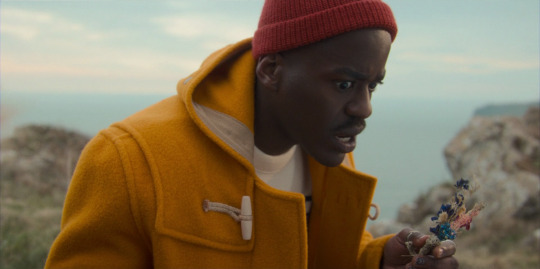
After the Doctor steps onto the fairy circle and disappears, Ruby unsuccessfully tries the TARDIS doors. She then checks around the other side to see if he’s having a pee. This may be the first time the show has canonically mentioned the Doctor goes to the bathroom. It’s funny to think of the great Time Lord having a slash off the edge of a cliff. The Doctor seems to do a lot of important things on cliff edges these days. Failing to find the Doctor, it’s then that Ruby notices a strange old woman standing under a creepy old tree from 73 yards away making some sort of hand gestures. However, the closer she walks toward the woman, the further she appears away.

The mechanism of how the woman moves is hidden by editing, but it feels like something Ruby would notice quickly. I don’t imagine Ruby walking closer would cause the woman to start backing up physically like that Community episode where Professor Duncan got a restraining order on Chang and used it like he had force powers. Instead, they cut back to the woman and she’s simply further away. Ruby is conveniently looking for footing every time, so she fails to see this. But if you started walking toward someone and they started hovering backwards, wouldn’t you find that weird? It’s not like she doesn’t sense something weird pretty early on. She even asks the woman if the Doctor’s disappearance has anything to do with her. She even asks the hiker (yet another character played by Susan Twist) if she can see the old woman.
Something I found interesting about the Susan Twist scene was that whoever her character is, she’s not immune to the effects of the old woman. Either that, or she’s lying. Either way, it feels important that we were shown her having the same reaction to the woman as everyone else. If she’s a magical trickster, she’s not an invincible one, or maybe she’s not magical at all. We’ve learned very little about Susan Twist’s character(s), but this indicates that she’s not fully in charge of the situation if she can be scared off like that. What’s frustrating is that the first time a character looks at her and says “Hey don’t I know you from somewhere?” it’s in an aborted timeline. I would have expected the Doctor to have made the connection after the ambulance screens in “Boom,” matched the woman from Space Babies, but maybe he’s been distracted by clothes.
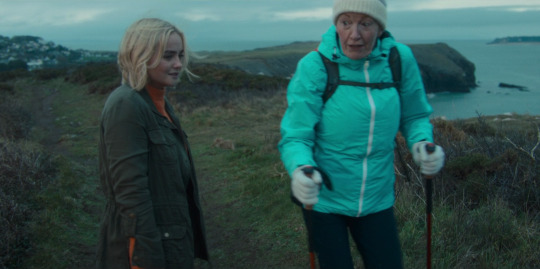
By this point in the episode, I’ve been fully drawn in. Ruby finds her way to the small village of Glyngatwg and a pub called “Y Pren Marw,” which translates to “The Dead Wood.” I thought this might have been a reference to the weird tree on the cliff, but the illustration on the pub sign looked more like an oak tree, so I doubt it. Another name they could have used for the pub could have been “The Gaslight Inn,” because man oh man did they gaslight the hell out of Ruby. They keep accusing her of thinking they’re yokels for asking pretty innocuous questions. Asking if you can pay with your phone is perfectly reasonable. There’s a chippy in my village that does the best fish n chips in the area, but I never use them because they haven’t got a card machine and I don’t carry cash. I don’t imagine the owner of the chippy goes home every night in his Fred Flintstone car because of it. Maybe they’re worried they really are yokels. Either way, five quid for a Coke and abusive staff? What’s their Trip Advisor score? Negative six?
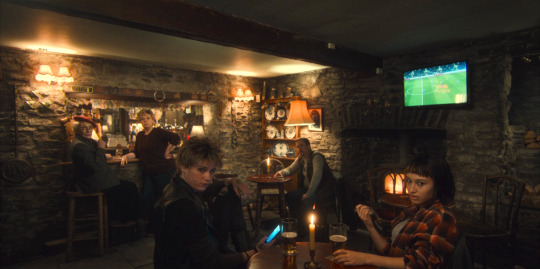
The only non-yokel in the pub is Enid and that’s solely because she’s played by Siân Phillips, who could never be mistaken for common. She was easily the highlight of the episode for me, sitting elegantly at the bar in her fashionable hat. Of all of the patrons at the bar, she’s the one I believe would coin the Latin phrase “semper distans,” to describe the way the old woman follows but never approaches. If only she could have taught Isaac Newton the word “gravitas.” Beyond being incredibly rude, I rather enjoyed the patrons of Y Pren Marw. They reminded me of characters you would have found in classic Doctor Who. The pub scenes reminded me a lot of “The Dæmons,” or “Terror of the Zygons.” But more than anything, this episode reminded me of “The Stones of Blood,” wherein things start like folk horror and end in a more mundane setting.

After Ruby’s unwanted follower scares away one of the pub’s most faithful patrons, she’s forced to head back to London, which is about where the episode starts to lose steam. Up until that moment, I was expecting a sort of witch coven or worse to spring up in the sleepy village of Glyngatwg. I was ready to call it RTD’s best ever. But now we’re back in London where the biggest mystery is Mrs Flood, and she’s really only there to remind us she exists. But that’s not to say a piece of Glyngatwg didn’t leave with Ruby, and it’s not to say I disliked the story’s ending. But there was a noticeable drop in excitement the moment Ruby boarded that train.
I found it odd that Carla and Cherry were badmouthing the Doctor in his absence. Cherry was ready to jump his bones the last time they spoke and now he’s good for nothing. I get that they want to support Ruby, but like, what if he’s hurt somewhere? All I’m saying is that if I ever go missing, please don’t send Carla and Cherry to find me. After telling Carla about the old woman, Ruby’s deepest fears are realised. Like Susan Twist and Josh before her, talking to the old woman causes her to abandon Ruby. The look Carla gives Ruby from the cab as it drives away is the last way anyone would want to be looked at by their loved one. It wasn’t a look of fear, it was a look of disgust.
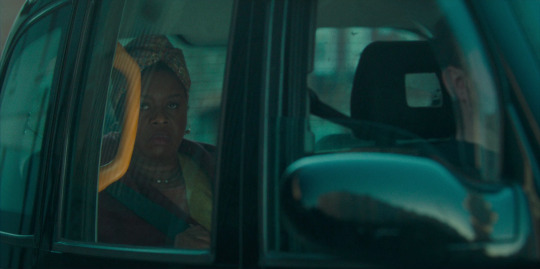
It’s that look of disgust that really started to make me think of another story from the Whoniverse- “The Curse of Clyde Langer,” a Sarah Jane Adventures episode written by Phil Ford. In it, Clyde’s name becomes cursed and anyone who hears or reads it becomes irrationally opposed to Clyde. His friends and family disown him and it’s Clyde against the world, which is wild because Clyde’s one of my favourite characters in all of Doctor Who. Who could hate that precious cinnamon roll? Even further, who could forget that episode? Well, it turns out Davies was kinda hoping the answer would be you. I’m not saying Davies is out of ideas, but he seems to be “remixing,” a lot of what has come before. More on that in a moment.
After losing her family, Ruby gets on with life, but not before being given a spark of hope in the form of Kate Lethbridge-Stewart. We even learn some things about the old woman from Kate. We establish that yes, it is always 73 yards away. And no matter how close a person gets to her, she always looks as in focus as a person with 20/20 vision would see her from 73 yards. We also learn that the old woman’s “powers” work via headset, as Kate breaks contact with Ruby, leaving her devastated from losing yet another lifeline.

An interesting factoid about that scene is that Kate and Ruby were sitting across from “The House of Pi,” and Pi Day is the 73rd day of a non-leap year. Why do I know this? Because I went into a bit of a rabbit hole trying to learn about the number 73 yesterday. I looked into its mathematical significance. I learned it’s Sheldon Cooper’s favourite number. I looked it up in terms of numerology. I read the 73rd Psalm. There are 73 books in the Catholic Bible. But none of it felt significant. Then my dumbass googled whether RTD had explained the number, and he claimed it was as simple as going outside and measuring the distance from which people’s faces began to blur. Right. Well, that’s disappointing, albeit creative.
We’re treated to a montage of Ruby getting on with her life throughout the next couple of decades. Like the rest of us, her age starts to show itself with long hair and big glasses. I mentioned earlier that Ruby suffers a bit from a lack of character development and this montage does nothing to help that. She grows up into possibly one of the most boring people they could have made her. Her queer group of friends she has a band with seem to have disappeared. Her dating life is painfully heteronormative. She didn’t date a single woman throughout that time? She would have learned by now not to encourage her friends to talk to the old woman, and due to the perception filter, it’s not like anyone seemed to mind her anyhow. I’m just saying, if someone as normie as her started wearing a political shirt for the nuclear war-hungry Albion Party, I’d look at her and say “Pssh. Figures.”
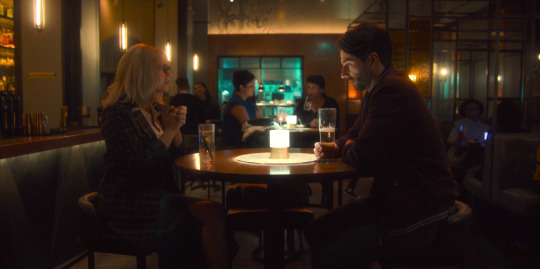
Speaking of the Albion Party, it’s time we started talking about Harold Saxon. Oh, sorry, I meant Roger ap Gwilliam. The episode implies that Roger is the trickster “Mad Jack" who had escaped the fairy circle after the Doctor stepped on it. But Davies is remixing the classics, or as LCD Soundsystem puts it- “Shut up and play the hits.” He even mistreats women in the same way as the Master. I took this to be Doctor Who’s flimsy attempt at a comment on the MeToo movement. It would work better if ap Gwilliam was more than a moustache-twirling miscreant. Especially because Ruby throws poor Marti to the lions by not warning her away from Roger. If this is a MeToo story, Ruby is an enabler, which is not a great look. But she apologises so I guess it’s ok. Don’t worry Marti, your trauma gets erased anyhow.

While the campaigners prepare for a press conference for Roger ap Gwilliam to announce that Britain has purchased Pakistan’s nuclear arsenal, Ruby realises she’s out of time and needs to act now. Using her semper distans friend to her advantage, Ruby backs 73 yards away from Roger and sends him cowering and eventually resigning from his position as prime minister. Ruby expects this to be the end of the old woman, but she remains with her until the day she’s on her deathbed, at which point, the old woman changes from her perspective to Ruby’s. As the old woman, Ruby sees her young self and is able to call out to her and warn her about the fairy circle. That’s what happened, right?
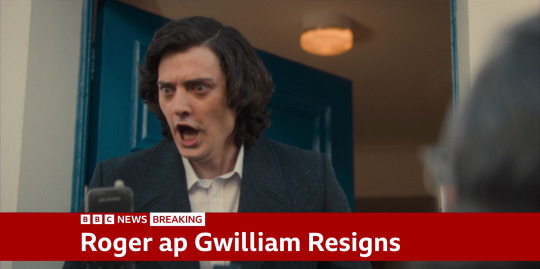
Well, maybe? The biggest curveball comes in the form of the old woman herself. Because while Ruby does age to the ripe old age of 80, the actress playing her is Amanda Walker. The actress playing the woman is Hilary Hobson. Set pictures have also revealed Hobson in make-up that appears to be scarring going up the left side of her face. And those hand gestures of hers? Sign language. Eagle-eyed viewers have roughly translated her signing as “Bless you. Thank you so much, that's so kind of you. When you gave me that little thing, it was just so precious. How am I ever going to repay you? But we will think of something.” Perhaps this scarred woman is someone the Doctor and Ruby have yet to meet. Perhaps she repays them by warning them away from the fairy circle and saving both the Doctor and Ruby from a bizarre fate.
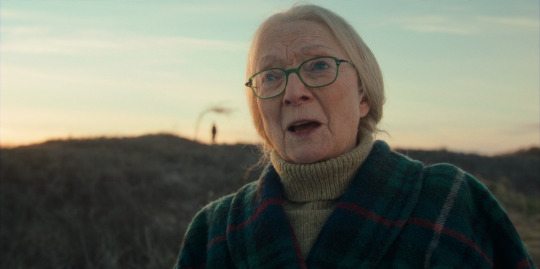
People seem divided by this episode in a major way, which is pretty normal for Doctor Who. But one of the more irritating takeaways I’ve seen is that the episode doesn’t make any sense. That’s only sort of true. There are some bootstrap paradox things occurring, which if you haven’t accepted as a reality of Doctor Who at this point, what are you even doing here? But what does the old woman say to Ruby? Where does the Doctor go? How does she travel back in time to the clifftops of Glyngatwg? Forgetting completely that we’re in a Doctor Who era which has introduced magic in a real way. But that’s a bit hand-wavy, can’t we do better? Well, they do mention that the TARDIS’s perception filter parked so close to the fairy circle might affect how people ignore the old woman. I liked this because it implies that the TARDIS and magic are somewhat compatible and therefore opens up new avenues for storytelling. You could also imply that if the TARDIS could affect the fairy circle, perhaps it can affect the TARDIS in turn. Maybe people reject Ruby because the warding spell placed on Mad Jack is affecting Ruby. Maybe Ruby needed to be in a position where she was so friendless that she would join the conservative party.
The episode may not have explicitly explained things, but it gives us enough of a vague framework to form an idea. As a fan of David Lynch, I am rather happy to exist in that liminal space. To straddle the cusp between the known and the unknown. It leaves an air of mystery, or as David Lynch would say “room to dream.” I will however slightly come down on the episode for its rather bland ending compared to its strong start. I don’t agree with the people who said it nosedives toward the end. But I would be lying if I said I lost a lot of interest the moment Ruby left Glyngatwg. Earlier, I compared the story to “The Stones of Blood,” but where the two stories differ is that when “The Stones of Blood,” changes its setting from the occult folk horror of the Cornish countryside, it replaces it with something equally strange.
That isn’t to say the jump to the year 2046 isn’t interesting. I’d be very curious to see how this story plays over the next few years. It acts as speculative fiction and the bizarre reality of speculative fiction is that it occasionally becomes mundane in hindsight. What once sounded unreasonable now feels painfully obvious. HBO’s “The Leftovers” hits different after the pandemic. Richard Kelly’s loony “Southand Tales,” feels tame after the 2016 election. Therein, I fear the day Roger ap Gwilliam becomes something more than a cartoonish depiction of British politicians. Partly because of the implied threat of nuclear devastation, but also because 2046 feels like a rather generous timeframe.
#Doctor Who#73 Yards#Russell T Davies#Millie Gibson#Ruby Sunday#Ncuti Gatwa#Fifteenth Doctor#Roger ap Gwilliam#Aneurin Barnard#Siân Phillips#Susan Twist#Kate Lethbridge-Stewart#Hilary Hobson#Amanda Walker#UNIT#Gemma Redgrave#timeagainreviews
24 notes
·
View notes